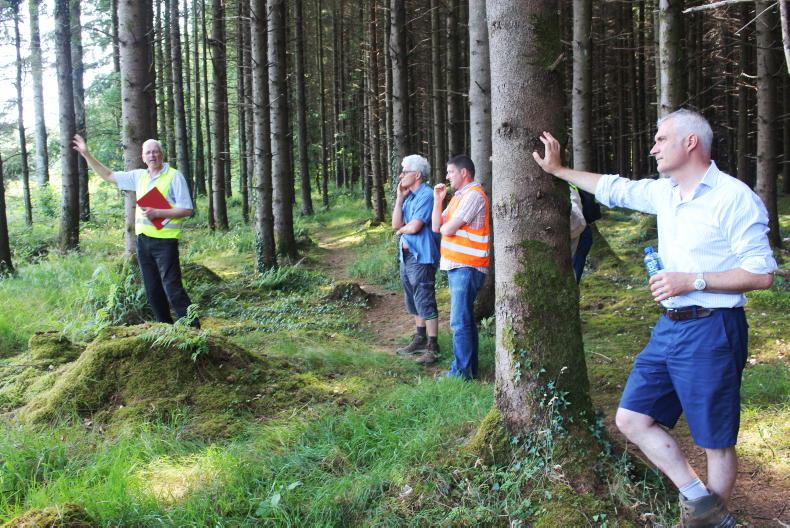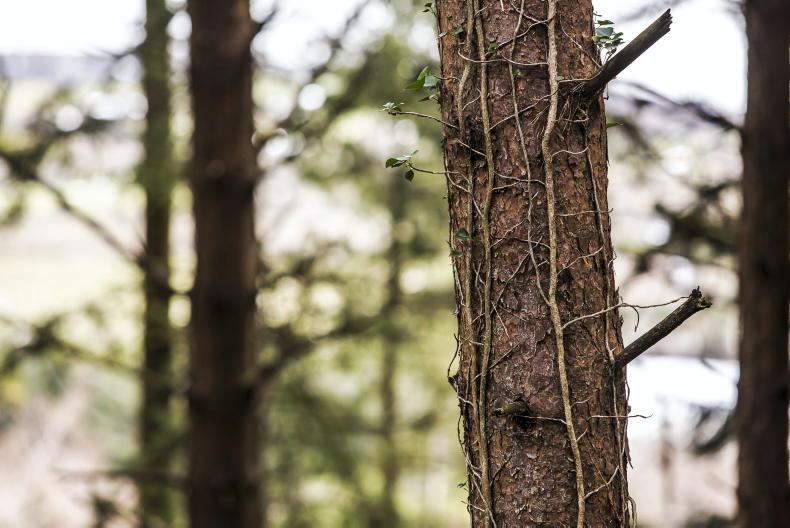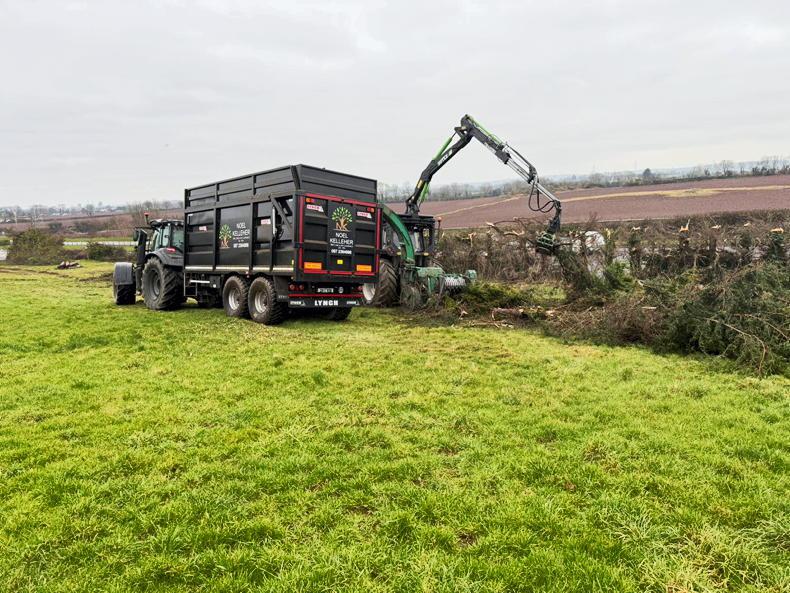Pippa Hackett, Minister of State at the Department of Agriculture, Food and the Marine, has published the first interim report on the Mackinnon review or Project Woodland.
Submitted by the project board overseeing the implementation of Mackinnon, it will be followed by “the second and third interim reports in October and December and bi-monthly until the conclusion of the project”.
The board has agreed to advance two working group recommendations immediately comprising an external regulatory review and public consultation.
Regulatory review
An independent external regulatory review has been commissioned by the minister “relating to the 15km appropriate assessment (AA) screening and a review of the requirement for a licence for forest management operations such as thinning and forest roads”.
The external reviewer, will be tasked to:
Review the existing statutory framework for the licensing of forestry activities in relation to environmental and public participation obligations. Make recommendations about the Department’s processes and procedures to ensure they are as streamlined and efficient as possible and meet the relevant statutory obligations. [Consider] the legal and procedural arrangements in a sample of other EU member states in conducting this exercise, and to include in its recommendations any lessons to be learnt from that exercise. Include specific considerations for differentiating between projects regarding scale, location and type, and having regard to legal and regulatory requirements and to also consider a single consent licence.Evaluate the current 15km radius for AA screening or recommend an alternative objective approach, having regard to EU law. The report also comments on the role of the new business systems analyst, which “has already commenced a review of processes under the current system, including those related to AA to ensure that it functions as effectively as possible”.
Public consultation
“On the critically important work on the development of a shared vision for forestry, the project board has already agreed to prioritise the commencement of an effective and inclusive public consultation,” the report states.
“The Department is working immediately to put in place the structures for this to start now.”
This is on the foot of a working group recommendation for “co-creation to develop a new national vision by the end of 2021 and a new national forestry strategy by May 2022”.
This work has begun, containing key elements, indicative timescales and involvement by a wide range of stakeholders including the forestry policy group in Project Woodland and other organisations such as the Irish Rural Link.
Other recommendations
The interim report comments on a range of issues raised by the four working groups. The licence backlog features prominently. The project board “recognises the need to deal with the backlog as a matter of urgency, but also the need to manage the potential tensions between maximising output and ringfencing resources to deal with older cases”.
The board states that “the ‘triage team’ which the Department has deployed to felling licences should be immediately used to similar effect on backlogged roads and afforestation licences and a report supplied to the project board by the end of September”.
Responding to issues raised on the Department dashboard, the report states that the Department is to finalise a monthly dashboard by the end of August with a date that “needs to be clarified to ensure it is accurate and outlines the situation clearly and fairly”.
The board welcomes working group recommendations including the development of a customer charter and an organisational development review, which requires “fully engaged” involvement by Department staff.
In relation to creating greater communications, the board refers to the recent calls for promotion while the Department “is working to engage a communications specialist to support Project Woodland”.
The merit of the working group proposal that a grant be made available when foresters and landowners compile environmental reports was accepted “in principle” but the board added that “there may be State aid or other legal barriers to the provision of a grant to meet statutory requirements”.
The recommended next step by the Department is to complete a legal analysis of this proposal by the end of October and “consider opportunities to simplify the report and grant structure”.
Regarding pre-application consultation between foresters and Department inspectors, “the board considers that a pre-application consultation is likely to help improve the quality of applications and increase the overall efficiency of the licensing system”.
Reaction
The reaction to the interim report is generally positive. While a spokesperson for the forestry consultants accepts that issues such as “ash dieback and opportunities arising from the growth in carbon markets” are outside the remit of the report, he said ash dieback, in particular, needs to be addressed as a priority.
There were some criticisms on project timescales. The spokesperson said the legal implications of the working group proposal for a grant to be made available to foresters and landowners when compiling environmental reports such as NISs should have been delivered by June rather than October.
Pat O’Sullivan, technical director of the Society of Irish Foresters, welcomed the interim report but said “the next report should include a date for the finalisation of Project Woodland and the implementation of the Mackinnon recommendations”.
Certification challenges discussed at Clonad forest field day
Forest certification was the main topic at the recent field day in Clonad Wood organised by the Irish Timber Growers Association (ITGA) in association with the Irish Forestry Unit Trust (IForUT), owner of the 142ha woodland in Co Offaly.
The field day, limited to under 50 participants – in accordance with COVID-19 guidelines – explored the implications of certification.
Certification verifies that forests are managed according to the principles of sustainable forest management (SFM) by two independent certification bodies – Forest Stewardship Council (FSC) and Programme for the Endorsement of Forest Certification (PEFC).
The field day heard that in Ireland, Coillte and Northern Ireland Forest Service forests and an increasing number of private forests, including IForUT, are certified.
Owners of small forests are not able to bear the cost of certification, but some are now joining group schemes to provide economies of scale.
All the main sawmills have chain of custody certification which allows them to use the FSC or PEFC brand on their products. A spokesperson for one of the sawmills stressed the importance of achieving nationwide certification.
“Currently, under the certification scheme, timber processors can process a maximum of 30% of uncertified wood from sustainably managed sources and still achieve chain of custody certification,” he said.
“However, many sawmills are now close to this limit and most will exceed it over the coming years as private log supply is forecast to exceed certified supply.”
The challenges and opportunities in achieving certification were addressed by Sarah Standish of IForUT and Donal Whelan, forest manager with Commercial Forestry Services.
Standish, who specialises in certification, outlined management planning and the various measures including health and safety standards required to comply with forest certification.
Brendan Lacey, CEO of IForUT and ITGA chair, outlined the positives of certification including enhanced professional reputation of forest owners as tangible proof of good forest stewardship.
“Legal compliances with statutory requirement provide a structure and process to follow,” he said.
“Certification can provide enhanced market access,” but referring to the 10ha Norway spruce stand in Clonad, he outlined some constraints.
“The final harvest in this stand has been deferred to 2026 and 2028 to facilitate age restructuring,” he explained.
“Given prices have increased by around 75% since 2019, we will now be at risk of lower prices when it does come to harvest, which is likely to happen when the licensing crisis gets sorted. This is a cost of certification which can put constraints on flexibility around harvest timing in volatile market periods.”
He acknowledges that Clonad has a high public recreation value, especially as it located close to Tullamore, but asks: “Will forest owners be compensated for these non-timber values where there can be a real cost and price loss?”
He also points to increased management costs. “IForUT has hired two people this year because of an increasing compliance workload in achieving and retaining certification.”
Pippa Hackett, Minister of State at the Department of Agriculture, Food and the Marine, has published the first interim report on the Mackinnon review or Project Woodland.
Submitted by the project board overseeing the implementation of Mackinnon, it will be followed by “the second and third interim reports in October and December and bi-monthly until the conclusion of the project”.
The board has agreed to advance two working group recommendations immediately comprising an external regulatory review and public consultation.
Regulatory review
An independent external regulatory review has been commissioned by the minister “relating to the 15km appropriate assessment (AA) screening and a review of the requirement for a licence for forest management operations such as thinning and forest roads”.
The external reviewer, will be tasked to:
Review the existing statutory framework for the licensing of forestry activities in relation to environmental and public participation obligations. Make recommendations about the Department’s processes and procedures to ensure they are as streamlined and efficient as possible and meet the relevant statutory obligations. [Consider] the legal and procedural arrangements in a sample of other EU member states in conducting this exercise, and to include in its recommendations any lessons to be learnt from that exercise. Include specific considerations for differentiating between projects regarding scale, location and type, and having regard to legal and regulatory requirements and to also consider a single consent licence.Evaluate the current 15km radius for AA screening or recommend an alternative objective approach, having regard to EU law. The report also comments on the role of the new business systems analyst, which “has already commenced a review of processes under the current system, including those related to AA to ensure that it functions as effectively as possible”.
Public consultation
“On the critically important work on the development of a shared vision for forestry, the project board has already agreed to prioritise the commencement of an effective and inclusive public consultation,” the report states.
“The Department is working immediately to put in place the structures for this to start now.”
This is on the foot of a working group recommendation for “co-creation to develop a new national vision by the end of 2021 and a new national forestry strategy by May 2022”.
This work has begun, containing key elements, indicative timescales and involvement by a wide range of stakeholders including the forestry policy group in Project Woodland and other organisations such as the Irish Rural Link.
Other recommendations
The interim report comments on a range of issues raised by the four working groups. The licence backlog features prominently. The project board “recognises the need to deal with the backlog as a matter of urgency, but also the need to manage the potential tensions between maximising output and ringfencing resources to deal with older cases”.
The board states that “the ‘triage team’ which the Department has deployed to felling licences should be immediately used to similar effect on backlogged roads and afforestation licences and a report supplied to the project board by the end of September”.
Responding to issues raised on the Department dashboard, the report states that the Department is to finalise a monthly dashboard by the end of August with a date that “needs to be clarified to ensure it is accurate and outlines the situation clearly and fairly”.
The board welcomes working group recommendations including the development of a customer charter and an organisational development review, which requires “fully engaged” involvement by Department staff.
In relation to creating greater communications, the board refers to the recent calls for promotion while the Department “is working to engage a communications specialist to support Project Woodland”.
The merit of the working group proposal that a grant be made available when foresters and landowners compile environmental reports was accepted “in principle” but the board added that “there may be State aid or other legal barriers to the provision of a grant to meet statutory requirements”.
The recommended next step by the Department is to complete a legal analysis of this proposal by the end of October and “consider opportunities to simplify the report and grant structure”.
Regarding pre-application consultation between foresters and Department inspectors, “the board considers that a pre-application consultation is likely to help improve the quality of applications and increase the overall efficiency of the licensing system”.
Reaction
The reaction to the interim report is generally positive. While a spokesperson for the forestry consultants accepts that issues such as “ash dieback and opportunities arising from the growth in carbon markets” are outside the remit of the report, he said ash dieback, in particular, needs to be addressed as a priority.
There were some criticisms on project timescales. The spokesperson said the legal implications of the working group proposal for a grant to be made available to foresters and landowners when compiling environmental reports such as NISs should have been delivered by June rather than October.
Pat O’Sullivan, technical director of the Society of Irish Foresters, welcomed the interim report but said “the next report should include a date for the finalisation of Project Woodland and the implementation of the Mackinnon recommendations”.
Certification challenges discussed at Clonad forest field day
Forest certification was the main topic at the recent field day in Clonad Wood organised by the Irish Timber Growers Association (ITGA) in association with the Irish Forestry Unit Trust (IForUT), owner of the 142ha woodland in Co Offaly.
The field day, limited to under 50 participants – in accordance with COVID-19 guidelines – explored the implications of certification.
Certification verifies that forests are managed according to the principles of sustainable forest management (SFM) by two independent certification bodies – Forest Stewardship Council (FSC) and Programme for the Endorsement of Forest Certification (PEFC).
The field day heard that in Ireland, Coillte and Northern Ireland Forest Service forests and an increasing number of private forests, including IForUT, are certified.
Owners of small forests are not able to bear the cost of certification, but some are now joining group schemes to provide economies of scale.
All the main sawmills have chain of custody certification which allows them to use the FSC or PEFC brand on their products. A spokesperson for one of the sawmills stressed the importance of achieving nationwide certification.
“Currently, under the certification scheme, timber processors can process a maximum of 30% of uncertified wood from sustainably managed sources and still achieve chain of custody certification,” he said.
“However, many sawmills are now close to this limit and most will exceed it over the coming years as private log supply is forecast to exceed certified supply.”
The challenges and opportunities in achieving certification were addressed by Sarah Standish of IForUT and Donal Whelan, forest manager with Commercial Forestry Services.
Standish, who specialises in certification, outlined management planning and the various measures including health and safety standards required to comply with forest certification.
Brendan Lacey, CEO of IForUT and ITGA chair, outlined the positives of certification including enhanced professional reputation of forest owners as tangible proof of good forest stewardship.
“Legal compliances with statutory requirement provide a structure and process to follow,” he said.
“Certification can provide enhanced market access,” but referring to the 10ha Norway spruce stand in Clonad, he outlined some constraints.
“The final harvest in this stand has been deferred to 2026 and 2028 to facilitate age restructuring,” he explained.
“Given prices have increased by around 75% since 2019, we will now be at risk of lower prices when it does come to harvest, which is likely to happen when the licensing crisis gets sorted. This is a cost of certification which can put constraints on flexibility around harvest timing in volatile market periods.”
He acknowledges that Clonad has a high public recreation value, especially as it located close to Tullamore, but asks: “Will forest owners be compensated for these non-timber values where there can be a real cost and price loss?”
He also points to increased management costs. “IForUT has hired two people this year because of an increasing compliance workload in achieving and retaining certification.”










SHARING OPTIONS